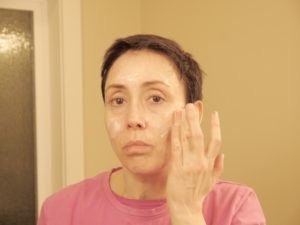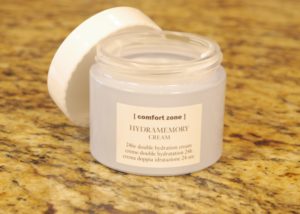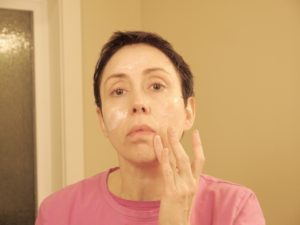Moisturizer
There are many good reasons to use a facial moisturizer. Keep skin hydrated is an important step toward keeping it healthy especially after an exfoliation. Facial moisturizers can enhance the functioning of the stratum corneum, the uppermost layer of skin. The stratum corneum is made up of fat, oil, and skin cells that help keep moisture in the skin. Applying a moisturizer to your face can increase the moisture level of the stratum corneum, prevent skin from drying out, and, if the moisturizer contains a sunscreen, also protect against sun damage. Ask your dermatologist to recommend the best moisturizers for your face.
A good analogy is to think of the skin’s surface like the paint job on a car. If the paint is cracked, the metal underneath is left unprotected from the elements and quickly oxidizes and rusts. The same concept goes for your stratum corneum. Once it’s dry, brittle, or cracked, you’ve lost your shield and the skin is vulnerable to exposure from the outside and water evaporates from the dermis. When the barrier function is compromised for any reason (trauma, wind, dry air, too many chemicals on your skin), bacteria enters the dermis through the cracks on the surface. The stratum corneum contains approximately 30 percent water and lipids. Its water content is essential, even though it’s made up of dead cells. If that dries out completely, it can’t protect the layers of skin underneath. Similar to the shiny coating on a car’s exterior, putting on moisturizer not only makes the surface look pretty, it seals and protects what is beneath it.
 Moisturizers can treat try skin and conditions like eczema, offer some sun protection and improve the appearance of skin all over your body. A basic moisturizer helps hold water in the skin’s outer layers. Emollients fill in tiny crevices between surfaces to keep skin smooth, while humectants draw water to the outermost layer of your skin for a dewy glow. Depending on your skin type, you may not need to moisturize your face or other areas as often as others. Your moisturizing routine could change based on the time of year and your environment.
Moisturizers can treat try skin and conditions like eczema, offer some sun protection and improve the appearance of skin all over your body. A basic moisturizer helps hold water in the skin’s outer layers. Emollients fill in tiny crevices between surfaces to keep skin smooth, while humectants draw water to the outermost layer of your skin for a dewy glow. Depending on your skin type, you may not need to moisturize your face or other areas as often as others. Your moisturizing routine could change based on the time of year and your environment.
Everyone knows that moisturizing your skin is important, but do you know why? The obvious answer is that your skin can get dry, but there are other effects that you need to know. You could develop more wrinkles. Sad but true – leaving moisturizer out of your daily routine could lead to deeper wrinkles later on. When the skin becomes dry, the skin barrier is compromised, and a low grade chronic inflammation of the skin develops. Low levels of ongoing inflammation can ultimately lead to a breakdown of collagen and accelerated aging.
The wrinkles you already have will look worse. Dehydrated skin shows all the lines. Moisturizers containing hyaluronic acid are great for plumping up the skin. Also, your complexion will appear dry and flaky, especially if it’s cold outside. In the winter, humidity levels fall, and the dry air can dehydrate your skin and strip it of lipids, which are part of its protective outer layer — so irritants can enter more easily and cause redness and flaking.
 This might sound strange, but moisturizer really is your friend if you have blemishes. “Dryness can actually make your acne worse,” says Dr. Debbie Palmer, dermatologist and founder of Replere Skin Care. If you’re afraid of feeling too greasy, pick a moisturizer that suits your needs: for instance, an oil-free, fragrance-free, noncomedogenic moisturizer along with your acne regimen. Many of the effective skin care ingredients like retinoids, salicylic acid, and benzoyl peroxide tend to be very drying So when you don’t follow them up with moisturizer, you risk uncomfortable side effects like red, peeling skin. When this happens, most people stop using their powerful products regularly, so they wind up dealing with the side effects without reaping the full benefits.
This might sound strange, but moisturizer really is your friend if you have blemishes. “Dryness can actually make your acne worse,” says Dr. Debbie Palmer, dermatologist and founder of Replere Skin Care. If you’re afraid of feeling too greasy, pick a moisturizer that suits your needs: for instance, an oil-free, fragrance-free, noncomedogenic moisturizer along with your acne regimen. Many of the effective skin care ingredients like retinoids, salicylic acid, and benzoyl peroxide tend to be very drying So when you don’t follow them up with moisturizer, you risk uncomfortable side effects like red, peeling skin. When this happens, most people stop using their powerful products regularly, so they wind up dealing with the side effects without reaping the full benefits.
You know those little lines under your eyes? Those will look worse if you don’t hydrate your face before applying base makeup. Makeup sticks to dry areas on the skin and can even seep into fine lines. Wait about five minutes before using foundation so your moisturizer or primer can properly absorb.
Moisturizers are proven to help treat dry, damaged skin and improve skin texture. Maintaining a good moisturizing regimen will make you more comfortable, and it will also make you look better because, let’s face it, nobody looks their best with skin that is dry and flaky.
To continue with Skin Care 101 learn about Eye Creams
